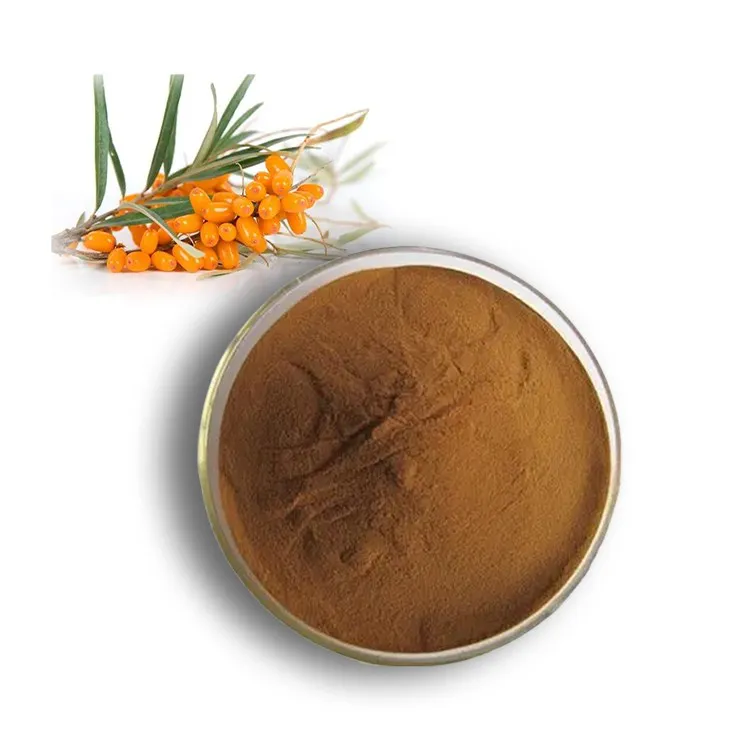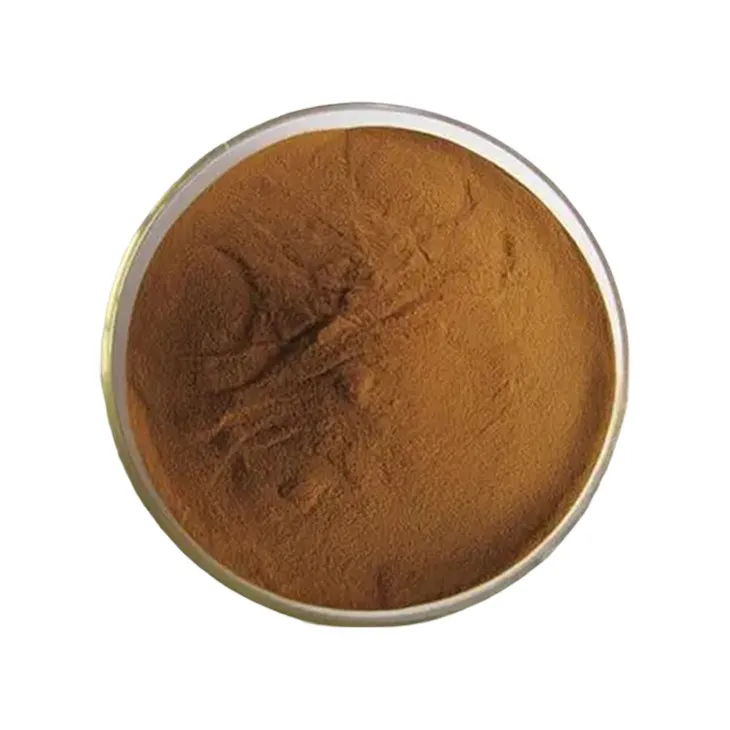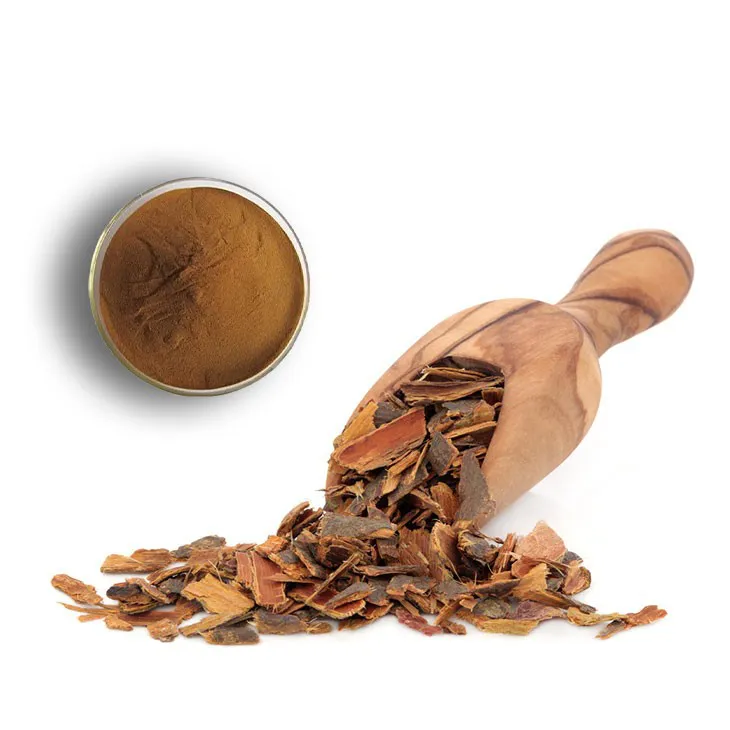- 0086-571-85302990
- sales@greenskybio.com
Sea - buckthorn bark extract: nature's best - kept secret.
2024-11-14

Introduction to Sea - Buckthorn bark extract
Sea - Buckthorn bark extract, also known as Shajibaipi extract, is truly a remarkable natural substance. It has been hidden away in nature for a long time, like a precious gem waiting to be discovered. This extract is obtained from the bark of the seabuckthorn plant, which is native to many regions around the world.

Antioxidant Properties
Antioxidants play a vital role in maintaining the health of our bodies. Sea - Buckthorn bark extract is rich in various antioxidant compounds. These antioxidants work by neutralizing free radicals, which are unstable molecules that can cause damage to our cells. Free radicals are produced as a result of normal metabolic processes in the body, as well as from external factors such as pollution, radiation, and cigarette smoke.
When free radicals are not neutralized, they can lead to a variety of health problems, including premature aging, heart disease, and cancer. The antioxidant properties of sea - buckthorn bark extract help to prevent this damage by donating an electron to the free radicals, making them more stable. This process helps to protect our cells and tissues from oxidative stress, which is a major contributor to many chronic diseases.

Anti - Inflammatory Properties
Inflammation is the body's natural response to injury or infection. However, chronic inflammation can be a problem and is associated with many diseases, such as arthritis, diabetes, and certain types of cancer. Sea - buckthorn bark extract has significant anti - inflammatory properties.
It contains compounds that can inhibit the production of inflammatory mediators in the body. These mediators are substances that are released during the inflammatory process and can cause pain, swelling, and redness. By reducing the production of these mediators, sea - buckthorn bark extract can help to relieve inflammation and its associated symptoms.

Applications in the Beauty Industry
Rejuvenating the Skin
The skin is constantly exposed to environmental stressors, such as UV radiation, pollution, and harsh chemicals. These factors can cause damage to the skin cells, leading to premature aging, wrinkles, and dullness. Sea - buckthorn bark extract can help to rejuvenate the skin by promoting cell regeneration.
It contains nutrients such as vitamins and fatty acids that are essential for healthy skin. These nutrients can penetrate deep into the skin layers, providing hydration and nourishment. The antioxidant and anti - inflammatory properties of the extract also help to protect the skin from damage and reduce inflammation, resulting in a more youthful and radiant complexion.
Keeping the Skin Healthy
Sea - buckthorn bark extract has antibacterial and antifungal properties, which make it useful in maintaining skin health. It can help to prevent skin infections caused by bacteria and fungi, which are common problems, especially in areas with high humidity or poor hygiene.
It also helps to regulate the sebum production in the skin. Sebum is an oily substance produced by the sebaceous glands in the skin. Excessive sebum production can lead to oily skin and clogged pores, which can cause acne and other skin problems. By regulating sebum production, sea - buckthorn bark extract can help to keep the skin clean and healthy.

Traditional Medicine and Sea - buckthorn Bark Extract
Sea - buckthorn has a long history of use in traditional medicine. In some cultures, it has been used for centuries to treat a variety of ailments. The bark extract may have been an important part of these traditional remedies.
Although traditional medicine was often based on empirical knowledge and observation, modern science is now beginning to uncover the scientific basis behind the use of sea - buckthorn bark extract. For example, some of the traditional uses of seabuckthorn in treating digestive problems may be related to its anti - inflammatory and antioxidant properties, which can help to soothe the digestive tract and protect it from damage.
Potential in the Treatment of Chronic Diseases
As mentioned earlier, the antioxidant and anti - inflammatory properties of sea - buckthorn bark extract make it a promising candidate for the treatment of chronic diseases.
- Heart Disease: The extract may help to reduce oxidative stress in the blood vessels, which can prevent the formation of plaques and reduce the risk of heart attacks and strokes.
- Diabetes: By reducing inflammation and oxidative stress, it may help to improve insulin sensitivity and regulate blood sugar levels.
- Cancer: Although it is not a cure for cancer, the antioxidant properties of the extract may help to protect normal cells from damage during cancer treatment and may also have some anti - cancer effects on cancer cells themselves.
However, it is important to note that more research is needed to fully understand the potential of sea - buckthorn bark extract in the treatment of these diseases. Clinical trials are required to determine the safety and effectiveness of the extract in humans.
Research and Future Prospects
Despite the many potential benefits of sea - buckthorn bark extract, there is still much that we do not know about this natural substance. Current research is focused on uncovering the full range of its biological activities and understanding how it interacts with the human body.
- One area of research is to identify all the active compounds in the extract. This will help to better understand its mechanism of action and may lead to the development of more targeted therapies.
- Another area is to conduct more in - vivo and in - vitro studies to evaluate its safety and effectiveness. These studies will provide valuable data for future clinical trials.
- Finally, researchers are also looking into ways to improve the extraction process to obtain a more pure and potent extract. This may involve the use of new extraction techniques and technologies.
The future prospects for sea - buckthorn bark extract are very promising. As more research is carried out, it is likely that we will discover even more benefits of this natural treasure. It may become an important ingredient in the development of new drugs, cosmetics, and functional foods.
FAQ:
What are the main components of seabuckthorn bark extract?
Seabuckthorn bark extract contains a variety of components, such as flavonoids, phenolic acids, etc. These components contribute to its antioxidant and anti - inflammatory properties.
How does seabuckthorn bark extract rejuvenate the skin?
The antioxidant properties of seabuckthorn bark extract help to combat free radicals in the skin. Free radicals can cause damage to skin cells, leading to aging. By neutralizing these free radicals, the extract can promote skin cell renewal, keep the skin elastic, and thus rejuvenate the skin.
What is the evidence for the anti - inflammatory properties of seabuckthorn bark extract?
Several scientific studies have shown that certain compounds in seabuckthorn bark extract can interfere with the inflammatory pathways in the body. For example, some in - vitro and in - vivo experiments have demonstrated its ability to reduce the production of inflammatory mediators, which is evidence of its anti - inflammatory properties.
Has seabuckthorn bark extract been used in traditional medicine? If so, how?
Yes, seabuckthorn bark extract may have been used in traditional medicine for centuries. In some traditional medicine systems, it might be used in the form of decoctions or ointments to treat various ailments, perhaps related to its anti - inflammatory or other beneficial properties.
What are the prospects for seabuckthorn bark extract in the treatment of chronic diseases?
Although current research is still in progress, the potential of seabuckthorn bark extract in treating chronic diseases is promising. Its antioxidant and anti - inflammatory properties may be beneficial for diseases such as cardiovascular diseases and certain autoimmune diseases. However, more in - depth research is needed to fully understand its mechanisms and develop effective treatment methods.
Related literature
- Antioxidant Activity of Seabuckthorn (Hippophae rhamnoides L.) Bark Extracts"
- "The Anti - Inflammatory Potential of Seabuckthorn (Hippophae rhamnoides) Bark Extract in Inflammatory Disorders"
- "Seabuckthorn Bark Extract: A Promising Ingredient in Skin Rejuvenation"
- ▶ Hesperidin
- ▶ Citrus Bioflavonoids
- ▶ Plant Extract
- ▶ lycopene
- ▶ Diosmin
- ▶ Grape seed extract
- ▶ Sea buckthorn Juice Powder
- ▶ Fruit Juice Powder
- ▶ Hops Extract
- ▶ Artichoke Extract
- ▶ Mushroom extract
- ▶ Astaxanthin
- ▶ Green Tea Extract
- ▶ Curcumin
- ▶ Horse Chestnut Extract
- ▶ Other Product
- ▶ Boswellia Serrata Extract
- ▶ Resveratrol
- ▶ Marigold Extract
- ▶ Grape Leaf Extract
- ▶ New Product
- ▶ Aminolevulinic acid
- ▶ Cranberry Extract
- ▶ Red Yeast Rice
- ▶ Red Wine Extract
-
Curcuma Longa Extract/Turmeric extract
2024-11-14
-
Rose Hip Extract
2024-11-14
-
Polygonum multiflorum extract
2024-11-14
-
Lemon Balm Extract
2024-11-14
-
Kidney Bean Extract
2024-11-14
-
Sea buckthorn Juice Powder
2024-11-14
-
Yohimbine Bark Extract
2024-11-14
-
Konjac Powder
2024-11-14
-
Sugarcane Extract
2024-11-14
-
Mulberry leaf Extract
2024-11-14





















